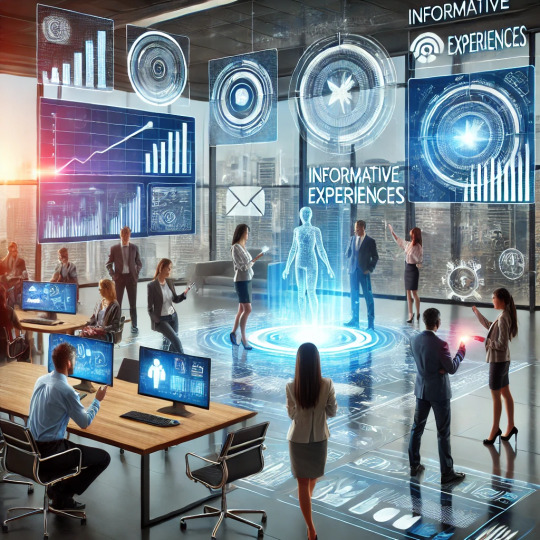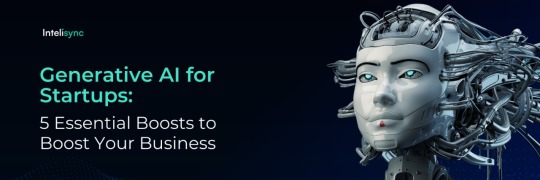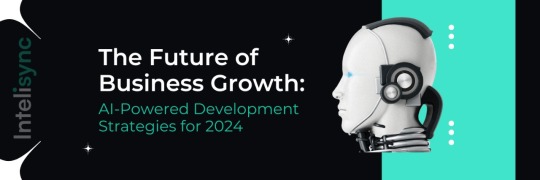#AI-powered decision-making tools
Explore tagged Tumblr posts
Text
AI Streamlining Decision-Making: Revolutionizing the Future of Business

Decision-making is at the core of every successful business strategy. With the rapid evolution of artificial intelligence (AI), companies are now harnessing the power of AI streamlining decision-making processes, leading to faster, more accurate, and cost-effective outcomes. Let’s dive into how AI is revolutionizing decision-making, its benefits, and real-world applications.
The Role of AI in Decision-Making
AI leverages data analysis, machine learning (ML), and advanced algorithms to process vast amounts of information. By identifying patterns and predicting outcomes, AI empowers businesses to make informed decisions without the constraints of human biases or limitations.
For instance, in industries like finance, healthcare, and manufacturing, AI tools analyze historical and real-time data to provide actionable insights. This not only reduces the time needed for decision-making but also enhances the quality of decisions.
Key Benefits of AI in Decision-Making
Increased Efficiency AI automates repetitive tasks and accelerates data analysis, allowing businesses to make faster decisions. For example, AI-powered tools in supply chain management optimize logistics and inventory decisions in real time.
Improved Accuracy AI eliminates human error by relying on data-driven insights. Predictive analytics tools, for example, help businesses forecast market trends and consumer behavior with high precision.
Cost Savings By automating complex processes, AI reduces operational costs. Companies can allocate resources more effectively, minimizing waste and maximizing profitability.
Enhanced Creativity and Innovation AI enables businesses to explore creative solutions by analyzing diverse datasets and uncovering unconventional insights. This fosters innovation and competitive advantage.
Personalization AI tailors decisions to individual customer preferences, boosting customer satisfaction. For instance, AI-driven marketing strategies target specific audiences with personalized content.
Real-World Applications of AI in Decision-Making
Healthcare AI assists doctors in diagnosing diseases and recommending treatments. AI algorithms analyze medical histories and imaging data to provide accurate diagnoses, improving patient outcomes.
Finance Financial institutions use AI to detect fraudulent transactions, assess credit risks, and manage investments. AI systems analyze market trends to guide traders in making profitable decisions.
Retail Retailers utilize AI to optimize pricing strategies and predict consumer demand. Chatbots and virtual assistants enhance customer experiences by offering tailored product recommendations.
Manufacturing In manufacturing, AI-driven systems optimize production schedules and monitor equipment for predictive maintenance. This minimizes downtime and maximizes productivity.
Human Resources AI streamlines recruitment by analyzing resumes and identifying the best candidates. Employee performance analytics help HR teams make informed decisions about promotions and training programs.
Challenges in Implementing AI for Decision-Making
While AI offers numerous benefits, there are challenges to its implementation:
Data Privacy Concerns The reliance on large datasets raises concerns about the security and privacy of sensitive information. Companies must ensure compliance with data protection regulations.
Integration Issues Integrating AI systems with existing infrastructure can be complex and costly, particularly for small and medium-sized businesses.
Bias in AI Models AI systems may inherit biases from training data, leading to unfair or inaccurate decisions. Continuous monitoring and updates are essential to mitigate this risk.
Skill Gap The adoption of AI requires skilled professionals to develop, manage, and interpret AI systems. Companies must invest in training programs to bridge this gap.
Best Practices for Adopting AI in Decision-Making
Start Small Begin with pilot projects to understand AI’s potential and scalability within your organization.
Ensure Data Quality High-quality data is crucial for accurate AI insights. Implement robust data collection and cleaning processes.
Invest in Training Educate employees about AI tools and their applications to build a skilled workforce.
Monitor and Optimize Continuously evaluate AI systems to address biases and improve performance.
Collaborate with Experts Partner with AI solution providers and experts to implement tailored AI strategies.
The Future of AI in Decision-Making
The future of AI in decision-making is promising. As technology advances, AI systems will become more intuitive, providing even deeper insights. Emerging trends like explainable AI (XAI) will ensure transparency and trust in AI-driven decisions.
Moreover, industries will witness the integration of AI with other technologies like blockchain and the Internet of Things (IoT). This convergence will further enhance the efficiency and accuracy of decision-making processes.
Conclusion
AI streamlining decision-making is no longer a futuristic concept—it is a present-day reality transforming industries. By embracing AI, businesses can unlock unparalleled opportunities for growth and innovation. However, the successful adoption of AI requires careful planning, continuous learning, and a commitment to ethical practices.
Whether you’re a small business owner or part of a large corporation, now is the time to explore how AI can revolutionize your decision-making processes. With the right strategies and tools, the possibilities are endless.
#artificial intelligence#technology#AI streamlining decision-making#Artificial intelligence in businessBenefits of AI in decision-making#AI-powered decision-making tools#AI applications in business#How AI improves decision-making#AI for business efficiency#Challenges of AI in decision-making#AI and predictive analyticsAI integration in industries#Future of AI in decision-making#AI-driven business strategies
0 notes
Text
Measuring What Matters: Using AI to Track Impact, Not Just Output
Measuring What Matters Using AI to Track Impact, Not Just Output You know what nobody talks about enough? The difference between looking busy and being effective. It’s easy to get wrapped up in KPIs and endless spreadsheets filled with numbers that feel important. But if your actions aren’t driving growth or worse, if you’re not even measuring the right outcomes, you’re not scaling. You’re…
#AI business intelligence tools#AI dashboards for entrepreneurs#AI for small business growth#AI-driven performance reports#AI-powered analytics#automate KPI tracking#Business consulting#Business Growth#Business Strategy#Entrepreneur#Entrepreneurship#Lori Brooks#measure business impact#OASIS method for business analysis#Productivity#Technology Equality#Time Management#track business performance with AI#use AI to improve decision-making
0 notes
Text
🧠 Ready to Think Smarter? Master These 7 Critical Thinking Exercises!
Saarthi For Success 🔍 A Step-by-Step Guide to Sharpen Your Critical Thinking SkillsCritical thinking is like a muscle—the more you use it, the sharper it gets! 🧠 Here’s a practical roadmap to boost your ability to evaluate arguments, spot logical flaws, and make better decisions.🛠️ Step 1: What is Critical Thinking?Ever tried defining it yourself?Exercise: Write your own definition.Identify…

View On WordPress
#AI Tools for Learning#AI-Powered Learning#Analytical Thinking#Boost Critical Thinking#Brain Teasers#Brain Training Tools#Canva Mind Mapping#ChatGPT for Learning#Chess for Critical Thinking#Cognitive Games#Critical thinking#Critical Thinking Exercises#Curio AI#Decision-Making Tools#Free Brain Games#Free Learning Resources#Free Tools for Learning#Improve Decision Making#Improve Focus and Memory#Leadership Skills Development#Learn Faster with AI#Logical Fallacies#Logical Reasoning#Lumosity#Mind Mapping Tools#Mindfulness in Thinking#NextGen Saarthi#Perplexity AI#Personal Growth Tools#Problem-Solving Frameworks
1 note
·
View note
Text
Custom GPT for Decision-Making: Fat Tony Weighs In On AI and Automation in Education
Discover why a custom GPT inspired by Nassim Taleb's "Fat Tony" might be your secret weapon for real-world decision-making. Tap into no-nonsense, street-smart advice to question assumptions, manage risk, and stay sharp in an AI-driven world.
Why Aren’t You Using a Custom GPT for Decision-Making? Fat Tony is a character inspired by Nassim Nicholas Taleb, the renowned scholar and author known for his work on risk, uncertainty, and probability, particularly in “The Black Swan” and “Antifragile.” Fat Tony represents the archetypal street-smart skeptic, a person who relies on intuition, practical experience, and a sharp sense for…
#AI in decision-making#AI in education#AI tools#AI-powered assistants#antifragility#Artificial Intelligence#automation#automation in education#contrarian thinking#Critical Thinking#Custom GPT for Decision-Making#education reform#Fat Tony#Fat Tony Custom GPT#Future of work#Graeme Smith#human skills vs AI#Nassim Taleb#personal growth#practical wisdom#real-world decision-making#risk management#Risk Management Advisor GPT#Strategy#Streetwise Decision-Making GPT
0 notes
Text
Generative AI for Startups: 5 Essential Boosts to Boost Your Business

The future of business growth lies in the ability to innovate rapidly, deliver personalized customer experiences, and operate efficiently. Generative AI is at the forefront of this transformation, offering startups unparalleled opportunities for growth in 2024.
Generative AI is a game-changer for startups, significantly accelerating product development by quickly generating prototypes and innovative ideas. This enables startups to innovate faster, stay ahead of the competition, and bring new products to market more efficiently. The technology also allows for a high level of customization, helping startups create highly personalized products and solutions that meet specific customer needs. This enhances customer satisfaction and loyalty, giving startups a competitive edge in their respective industries.
By automating repetitive tasks and optimizing workflows, Generative AI improves operational efficiency, saving time and resources while minimizing human errors. This allows startups to focus on strategic initiatives that drive growth and profitability. Additionally, Generative AI’s ability to analyze large datasets provides startups with valuable insights for data-driven decision-making, ensuring that their actions are informed and impactful. This data-driven approach enhances marketing strategies, making them more effective and personalized.
Intelisync offers comprehensive AI/ML services that support startups in leveraging Generative AI for growth and innovation. With Intelisync’s expertise, startups can enhance product development, improve operational efficiency, and develop effective marketing strategies. Transform your business with the power of Generative AI—Contact Intelisync today and unlock your Learn more...
#5 Powerful Ways Generative AI Boosts Your Startup#advanced AI tools support startups#Driving Innovation and Growth#Enhancing Customer Experience#Forecasting Data Analysis and Decision-Making#Generative AI#Generative AI improves operational efficiency#How can a startup get started with Generative AI?#Is Generative AI suitable for all types of startups?#marketing strategies for startups#Streamlining Operations#Strengthen Product Development#Transform your business with AI-driven innovation#What is Generative AI#Customized AI Solutions#AI Development Services#Custom Generative AI Model Development.
0 notes
Text
The Economic Impact of Ineffective Decision-Making in Global Companies
Ineffective decision-making poses significant risks to global companies, impacting financial performance, operational efficiency, strategic competitiveness, and reputational integrity. However, by leveraging AI insights from Xp, companies can mitigate these risks and make more informed, data-driven decisions. As companies continue to embrace AI as a strategic tool, the role of AI in enhancing decision-making and driving long-term success will only continue to grow, shaping the future of business in profound ways.

#market research#ai survey#market analysis#consumerbehavior#data driven decisions#data insights#market trends#machine learning#artificial intelligence#ai powered solutions#ai powered learning platform#ai powered tool#strategic planning#strategic decision making#strategicplanning#strategicmarketing#Decision-Making
0 notes
Text
Experience the transformative potential of Generative AI in Business Intelligence, unlocking actionable insights from your data.
#Advanced Analytics Tools#AI Predictive Analytics for Strategic Decision-Making#AI Predictive Analytics#AI-Based Forecasting Algorithms#AI-Based Forecasting#AI-Enabled Business Reporting Solutions#AI-Powered Data Visualization#Decision Support Systems with AI-Driven Insights#Generative AI in AI-Powered Business Intelligence#Generative AI in Business Intelligence Frameworks#Revolutionary Power of Generative AI
0 notes
Text
Experience the transformative potential of Generative AI in Business Intelligence, unlocking actionable insights from your data.
#Advanced Analytics Tools#AI Predictive Analytics for Strategic Decision-Making#AI Predictive Analytics#AI-Based Forecasting Algorithms#AI-Based Forecasting#AI-Enabled Business Reporting Solutions#AI-Powered Data Visualization#Decision Support Systems with AI-Driven Insights#Generative AI in AI-Powered Business Intelligence#Generative AI in Business Intelligence Frameworks#Revolutionary Power of Generative AI
0 notes
Text
Scaling Smart: How AI Helps Businesses Grow Without Chaos
Scaling Smart How AI Helps Businesses Grow Without Chaos When we talk about scaling a business, most people picture endless meetings, growing pains, and a to-do list so long it deserves its own zip code. But what if growth didn’t have to be chaotic? What if AI-powered automation could help businesses expand effortlessly… without the burnout? AI isn’t just a fancy buzzword; it’s the secret…
#AI and business success#AI and workflow automation#AI business strategies#AI chatbots for business#AI customer insights#AI decision-making#AI for business growth#AI for business owners#AI for customer experience#AI for entrepreneurs#AI for scaling startups#AI for small businesses#AI for startups#AI for sustainable growth#AI in e-commerce#AI scheduling tools#AI workflow optimization#AI-driven business scaling#AI-driven marketing#AI-driven productivity#AI-powered analytics#AI-powered automation#AI-powered efficiency#AI-powered operations#AI-powered project management#business automation tools#Business Growth#business growth without chaos#Business Strategy#Entrepreneur
0 notes
Text
Experience the transformative potential of Generative AI in Business Intelligence, unlocking actionable insights from your data.
#Advanced Analytics Tools#AI Predictive Analytics for Strategic Decision-Making#AI Predictive Analytics#AI-Based Forecasting Algorithms#AI-Based Forecasting#AI-Enabled Business Reporting Solutions#AI-Powered Data Visualization#Decision Support Systems with AI-Driven Insights#Generative AI in AI-Powered Business Intelligence#Generative AI in Business Intelligence Frameworks#Revolutionary Power of Generative AI
0 notes
Text
🧠 Ready to Think Smarter? Master These 7 Critical Thinking Exercises!
Saarthi For Success 🔍 A Step-by-Step Guide to Sharpen Your Critical Thinking SkillsCritical thinking is like a muscle—the more you use it, the sharper it gets! 🧠 Here’s a practical roadmap to boost your ability to evaluate arguments, spot logical flaws, and make better decisions.🛠️ Step 1: What is Critical Thinking?Ever tried defining it yourself?Exercise: Write your own definition.Identify…

View On WordPress
#AI Tools for Learning#AI-Powered Learning#Analytical Thinking#Boost Critical Thinking#Brain Teasers#Brain Training Tools#Canva Mind Mapping#ChatGPT for Learning#Chess for Critical Thinking#Cognitive Games#Critical thinking#Critical Thinking Exercises#Curio AI#Decision-Making Tools#Free Brain Games#Free Learning Resources#Free Tools for Learning#Improve Decision Making#Improve Focus and Memory#Leadership Skills Development#Learn Faster with AI#Logical Fallacies#Logical Reasoning#Lumosity#Mind Mapping Tools#Mindfulness in Thinking#NextGen Saarthi#Perplexity AI#Personal Growth Tools#Problem-Solving Frameworks
0 notes
Text
Smart Insights: AI Interfaces Driving BI Evolution

In such an ever-changing business arena, wisdom is one of the key assets and you have to rely not only on your intuition. Using Data Analytic Tools and Advanced Artificial Intelligence Models, one would be able to deduct the necessary strategic choices. The old trend was that the usage of such instruments mostly depended on particular experts to do it which happened to confine the utilization of these tools to most of the big organizations with their reliable data science teams. Yet the emergence of Generative AI Interfaces for instance is turning the tide beyond this traditional model of analytics democratizing access to advanced analytics and making it possible for small companies to be equipped with sophisticated analytics capabilities with unprecedented speed and thus making better decisions.
The AI Predictive Analytics has developed to a game changer in the realms of strategic decision making since it allows us to e pump up performance and business tremendously by predicting even the advanced matters of level. Leveraging AI-Based Forecasting Algorithms allows companies to react in a premitive manner to their mindsets, while foreclosed emerging opportunities and eliminating risks. By doing so, companies gain a significant competitive advantage in their industries. On the other hand, due to the complex nature of traditional analytics platforms, their adoption has been limited by the fact that to efficiently operate them one needs to be properly trained while an expert is preferable for navigation.
And these are the two areas in which Generative AI plays a major role, offering an innovative way to handle Business Intelligence (BI) problems through artificial intelligence, aimed at automating and simplifying the process. In contrast to traditional BI solutions that contains queries and examines fact-based static reports, Generative AI interfaces deploy machine intelligence which makes immediate relevant insights based on the unique needs and objectives of user. As a result, the individuals cut off from the loop manually for the model have required tasks been automated, not only has it eliminated human manipulation but also enabled users to discover the hidden patterns and correlations that were ignored by human analysts.
The use of Generative AI in BI applications proves to have various optimization options. First of all, these approaches increase scalability and accessibility of analytics solutions, thus granting organizations an opportunity to spread the advanced analytics capabilities not only across the departments but also across the functions without a need of specialised knowledge. AI-Empowered Business Analytics Software for Finance or Marketing teams will have AI-Powered Smart Interfaces which allow the users to derive actionable results with minimum learning.
Additionally, machine learning with AI, smart analytics and generative AI variation introduces a huge leap in the AI-driven wisdom capability allowing the organization to make informed decisions with certainty and lucidity. These systems transform huge data sets into valuable patterns which eventually amplify human decision-making proficiencies, thus, executives can tackle uncertain strategic issues hand in hand with analyzing capability. Whether it’s incorporating artificial supply chain management, demand forecasting or new revenue generation, AI Generative AI powered businesses in exploring new frontiers in their data resources.
The main example of the Generation AI is that, it is capable of adapting and developing new algorithms all the time as it’s instructed and the new information is provided. The ongoing cycle of continuous learning is the direct way towards improving the accuracy and reliability of AI-based forecasting. These points also give organizations the chance to stay nimble and adaptable to the dynamic business environment. Therefore, the companies will benefit from having a secured place in the future marketplace because generative AI is an effective and a revolutionary tool that enables them to stop losing to the competitors.
Besides, the democratization of Generative AI for Business Intelligence spurs innovation and entrepreneurship into a whole new dimension. It does this by lowering the door where most people can enter but in addition, it equips individuals with advanced analytics tools which they use to not only make data driven decisions but also try out new things. It isn’t sequestered to a small group of larger companies but rather is open to any business that wants to utilize it, and they are not discriminated against because of their size. Whether it is a startup looking to disrupt an industry or a small business seeking to optimise its operations, Generative AI interfaces level the playing field, enabling entities of every dimension to compete and succeed in digital economy.
In conclusion, the implementation of Generative AI inside Business Intelligence structure is a pivotal step for how to unlock the power of data with the purpose of encouraging the growth and creativity of organizations. Through the act of democratizing the advanced analytics tools and the premature artificial intelligence analytics, businesses gain wide access to advanced methods of decision making, faster. It can help unraveling hidden insights or making forecasts, or simply optimizing operations. This is how Generative AI interfaces become a new horizon of opportunities with which organization need to catch-up. Furthermore the journey of this disruptive technology is yet to discover its full extent and hence the future is highly satisfying.
#Advanced Analytics Tools#AI Predictive Analytics for Strategic Decision-Making#AI Predictive Analytics#AI-Based Forecasting Algorithms#AI-Based Forecasting#AI-Enabled Business Reporting Solutions#AI-Powered Data Visualization#Decision Support Systems with AI-Driven Insights#Generative AI in AI-Powered Business Intelligence#Generative AI in Business Intelligence Frameworks#Revolutionary Power of Generative AI
0 notes
Note
You’ve probably been asked this before, but do you have a specific view on ai-generated art. I’m doing a school project on artificial intelligence and if it’s okay, i would like to cite you
I mean, you're welcome to cite me if you like. I recently wrote a post under a reblog about AI, and I did a video about it a while back, before the full scale of AI hype had really started rolling over the Internet - I don't 100% agree with all my arguments from that video anymore, but you can cite it if you please.
In short, I think generative AI art
Is art, real art, and it's silly to argue otherwise, the question is what KIND of art it is and what that art DOES in the world. Generally, it is boring and bland art which makes the world a more stressful, unpleasant and miserable place to be.
AI generated art is structurally and inherently limited by its nature. It is by necessity averages generated from data-sets, and so it inherits EVERY bias of its training data and EVERY bias of its training data validators and creators. It naturally tends towards the lowest common denominator in all areas, and it is structurally biased towards reinforcing and reaffirming the status quo of everything it is turned to.
It tends to be all surface, no substance. As in, it carries the superficial aesthetic of very high-quality rendering, but only insofar as it reproduces whatever signifiers of "quality" are most prized in its weighted training data. It cannot understand the structures and principles of what it is creating. Ask it for a horse and it does not know what a "horse" is, all it knows is what parts of it training data are tagged as "horse" and which general data patterns are likely to lead an observer to identify its output also as "horse." People sometimes describe this limitation as "a lack of soul" but it's perhaps more useful to think of it as a lack of comprehension.
Due to this lack of comprehension, AI art cannot communicate anything - or rather, the output tends to attempt to communicate everything, at random, all at once, and it's the visual equivalent of a kind of white noise. It lacks focus.
Human operators of AI generative tools can imbue communicative meaning into the outputs, and whip the models towards some sort of focus, because humans can do that with literally anything they turn their directed attention towards. Human beings can make art with paint spatters and bits of gum stuck under tennis shoes, of course a dedicated human putting tons of time into a process of trial and error can produce something meaningful with genAI tools.
The nature of genAI as a tool of creation is uniquely limited and uniquely constrained, a genAI tool can only ever output some mixture of whatever is in its training data (and what's in its training data is biased by the data that its creators valued enough to include), and it can only ever output that mixture according to the weights and biases of its programming and data set, which is fully within the control of whoever created the tool in the first place. Consequently, genAI is a tool whose full creative capacity is always, always, always going to be owned by corporations, the only entities with the resources and capacity to produce the most powerful models. And those models, thus, will always only create according to corporate interest. An individual human can use a pencil to draw whatever the hell they want, but an individual human can never use Midjourney to create anything except that which Midjourney allows them to create. GenAI art is thus limited not only by its mathematical tendency to bias the lowest common denominator, but also by an ideological bias inherited from whoever holds the leash on its creation. The necessary decision of which data gets included in a training set vs which data gets left out will, always and forever, impose de facto censorship on what a model is capable of expressing, and the power to make that decision is never in the hands of the artist attempting to use the tool.
tl;dr genAI art has a tendency to produce ideologically limited and intrinsically censored outputs, while defaulting to lowest common denominators that reproduce and reinforce status quos.
... on top of which its promulgation is an explicit plot by oligarchic industry to drive millions of people deeper into poverty and collapse wages in order to further concentrate wealth in the hands of the 0.01%. But that's just a bonus reason to dislike it.
2K notes
·
View notes
Text
The Future of Business Growth: AI-Powered Development Strat

AI-powered development is revolutionizing business growth, efficiency, and innovation. By 2024, businesses that harness AI's potential will achieve unprecedented growth, outpacing their competitors. AI's incorporation into business operations enhances productivity, accuracy, and customer experience, driving revenue growth. McKinsey's report indicates that AI could deliver an additional $13 trillion to the global economy by 2030. With the global AI market expected to grow at a CAGR of 37.3% from 2023 to 2030, AI's role in business is becoming increasingly crucial.
AI-powered development uses advanced technologies like machine learning, natural language processing, and computer vision to perform tasks that typically require human intelligence. AI is transforming industries from finance to healthcare, providing solutions like automated trading systems and predictive diagnostics. AI enhances efficiency by automating repetitive tasks, optimizing operations, and enabling employees to focus on strategic activities. AI-driven chatbots and virtual assistants offer real-time support and personalized interactions, improving customer experience. AI's predictive analytics capabilities provide data-driven insights, helping businesses make informed decisions and stay ahead of market trends.
For businesses to fully leverage AI's benefits, a strategic approach to AI implementation is essential. This includes evaluating goals, identifying data sources, selecting appropriate AI tools, and investing in training and education. Addressing challenges like data privacy, system integration, and ethical considerations is critical for successful AI adoption. Partnering with Intelisync can facilitate this process, providing comprehensive AI services that ensure successful AI integration and maximize business impact. Intelisync's expertise in machine learning, data analytics, and AI-driven automation helps businesses unlock their full potential. Contact Intelisync today to start your AI journey and transform your Learn more....
#AI Development#AI-Powered Development for Businesses#AI-Powered Development: Boosting Business Growth in 2024#Blockchain Development Solution: Intelisync Boost Decision-Making#Boosting Business Growth in 2024#Challenges and Considerations in AI Adoption#Choose the Right AI Tools and Technologies#Evaluate your Goals and Needs#How can AI drive innovation in my business?#How can AI increase efficiency in my business?#How can Intelisync help with AI implementation?#Identify the Right Data Sources#Implementing AI in Your Business Improved Customer Experience#Increased Efficiency Innovation and Competitive Advantage#Intelisync AI Consulting#intelisync ai service Invest in Training and Education#Top 5 Benefits of AI#Top 5 Benefits of AI-Powered Development for Businesses#Understanding AI-Powered Development#Vendor Selection#What is AI Development#What is AI-Powered Development#What is the Future of AI-Powered Development in Business?#intelisync ai development service.
0 notes
Text
AI’s Role in Redefining Corporate Strategy: Insights from Xp
Corporate strategy has never been more critical. Companies must navigate an array of challenges, from shifting consumer preferences and global competition to technological disruptions and regulatory changes. In this environment, the role of artificial intelligence (AI) in redefining corporate strategy has become increasingly pronounced. Leveraging AI-driven insights, companies can gain a competitive edge, anticipate market trends, and make informed decisions that drive long-term success. In this blog, we’ll explore the transformative impact of AI on corporate strategy and draw insights from Xp.

#market analysis#online survey#market research#market research surveys#consumerbehavior#ai survey#corporatestrategy#datainsights#market trends#market growth#deeper insights#actionable insights#ai driven decision making processes#consumer preferences#AI-powered risk management tools#AI-driven market segmentation#market dynamics#california news
0 notes
Note
genuinely curious but I don't know how to phrase this in a way that sounds less accusatory so please know I'm asking in good faith and am just bad at words
what are your thoughts on the environmental impact of generative ai? do you think the cost for all the cooling system is worth the tasks generative ai performs? I've been wrangling this because while I feel like I can justify it as smaller scales, that would mean it isn't a publicly available tool which I also feel uncomfortable with
the environmental impacts of genAI are almost always one of three things, both by their detractors and their boosters:
vastly overstated
stated correctly, but with a deceptive lack of context (ie, giving numbers in watt-hours, or amount of water 'used' for cooling, without necessary context like what comparable services use or what actually happens to that water)
assumed to be on track to grow constantly as genAI sees universal adoption across every industry
like, when water is used to cool a datacenter, that datacenter isn't just "a big building running chatgpt" -- datacenters are the backbone of the modern internet. now, i mean, all that said, the basic question here: no, i don't think it's a good tradeoff to be burning fossil fuels to power the magic 8ball. but asking that question in a vacuum (imo) elides a lot of the realities of power consumption in the global north by exceptionalizing genAI as opposed to, for example, video streaming, or online games. or, for that matter, for any number of other things.
so to me a lot of this stuff seems like very selective outrage in most cases, people working backwards from all the twitter artists on their dashboard hating midjourney to find an ethical reason why it is irredeemably evil.
& in the best, good-faith cases, it's taking at face value the claims of genAI companies and datacenter owners that the power usage will continue spiralling as the technology is integrated into every aspect of our lives. but to be blunt, i think it's a little naive to take these estimates seriously: these companies rely on their stock prices remaining high and attractive to investors, so they have enormous financial incentives not only to lie but to make financial decisions as if the universal adoption boom is just around the corner at all times. but there's no actual business plan! these companies are burning gigantic piles of money every day, because this is a bubble
so tldr: i don't think most things fossil fuels are burned for are 'worth it', but the response to that is a comprehensive climate politics and not an individualistic 'carbon footprint' approach, certainly not one that chooses chatgpt as its battleground. genAI uses a lot of power but at a rate currently comparable to other massively popular digital leisure products like fortnite or netflix -- forecasts of it massively increasing by several orders of magnitude are in my opinion unfounded and can mostly be traced back to people who have a direct financial stake in this being the case because their business model is an obvious boondoggle otherwise.
841 notes
·
View notes